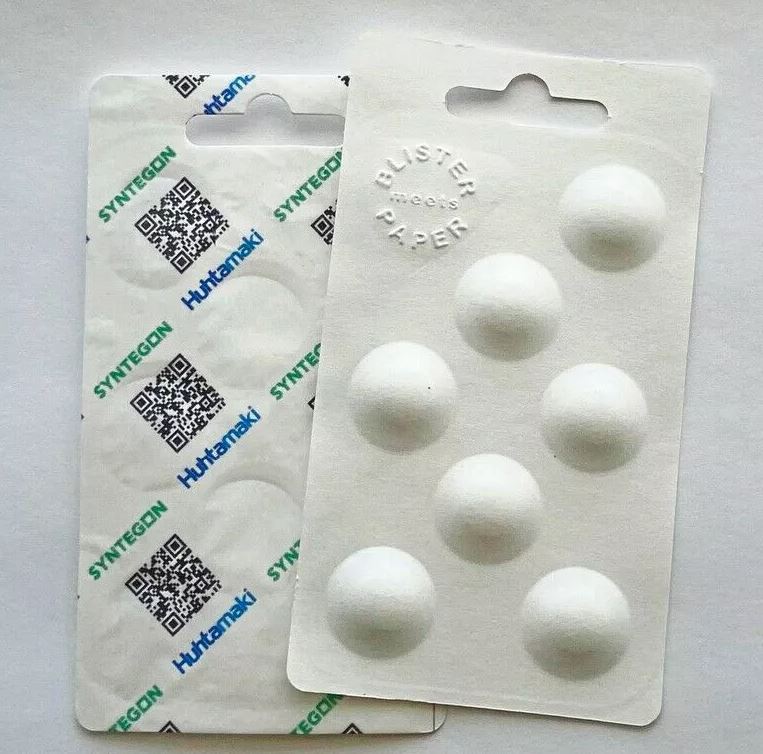Since packaging offers an important lever to act in an eco-friendly way, pharmaceuticals manufacturers have been eager to seek alternatives to traditional packaging materials and styles. Recyclable mono-laminates or even paper can pave the way to a more sustainable future. Syntegon developed a solution to produce paper-based push-through blister packaging for tablets and capsules.
Sustainability is far more than a buzzword. Companies around the globe share a common goal: to reduce their environmental impact and save resources. Sustainability in the pharmaceuticals industry, for instance, includes many facets, from decarbonising operations by using renewable energies, to reducing or changing packaging materials. In this respect, recyclable and/or biodegradable solutions are pushing to the fore. At the same time, they pose a challenge for pharmaceuticals manufacturers: how can they replace existing materials, like traditional plastics, without compromising on efficiency and product quality, two pillars of pharmaceuticals production?
The need for flexibility
Besides packaging quality and rigorous hygienic standards, efficiency has always been a key requirement in the pharmaceuticals industry. On the one hand, life-saving medicines call for efficient processes and often high outputs to ensure steady market supply. Therefore, in recent times, the industry has seen strong demand for highly flexible operations. Pharmaceuticals manufacturers need equipment that allows them to quickly change between products, filling methods and packaging formats. In addition, fast and easy cleaning plays a major role to ensure high product quality and ultimately, patient safety.
On the other hand, technological, regulatory and market changes make flexibility essential: packaging machines must be easily adaptable to new packaging materials or formats. While polyvinyl chloride (PVC) may be the packaging material of choice for e. g. standard blister packs, changing regulations and market demands may lead to recyclable polypropylene (PP) or even paper taking over that role.
Any changes to packaging materials call for equipment that can easily process a wide range of options while ensuring smooth and efficient operations. As a trend-conscious packaging solution provider, Syntegon has been actively monitoring these developments and devised technologies that help pharmaceuticals manufacturers meet their efficiency, flexibility, and sustainability goals at the same time.
Focus on mono-laminates and paper
Syntegon began investing in the development of equipment solutions at an early stage to support sustainable pharmaceutical production. This includes applying its know-how in processing sustainable packaging materials to demanding pharmaceutical tasks where non-recyclable plastics have been the norm. The company recently developed a solution called “Blister meets Paper,” which sparked an impressive response on the market and received the German Packaging Award in 2021.
The paper-based push-through blister packaging for tablets and capsules is particularly suitable for nutraceuticals. It comes with a barrier and a heat-sealable layer, which makes the paper blister’s barrier properties comparable to those of classic mono-PVC or aluminum blisters. Both the base and lidding material can be recycled. Thanks to the combination of the TPU 1000 form, fill and seal machine for paper packaging, the 3D formable FibreForm paper from paper manufacturer Billerudkorsnäs, and the sealable barrier coating from partner Huhtamaki, paper with the geometry required for many conventional tablets can be formed. With a double-cavity clamshell design, Syntegon even offers a paper-based solution for capsules.
Alternatives to plastics
Paper blisters can be readily processed on Syntegon machines and represent a sustainable alternative to the non-recyclable plastics and aluminum that are widely used. The paper forming technology also meets the industry’s need for flexibility, as it makes it possible to create different shapes and package styles for tablets and capsules. Available machine designs target a mid-output range. The TPU 1000 form, fill and seal system, for instance, mechanically produces paper pods and blisters at rates of up to 15,000 packages per hour while ensuring tight seals. Paper pods can be sealed with any heat-sealable lidding materials; barriers can be perfectly tailored to customer needs to ensure the necessary protection and high quality of the packaged product. For additional shelf appeal, paper forming allows the use of personalised high-quality packaging designs and embossing.
It all starts with questions
Changing a running system, however, poses various challenges that pharmaceuticals companies and equipment providers need to address before any sustainably packaged tablet or capsule can go to market. While switching from plastic to paper may sound simple, it often involves several questions that all parties involved need to consider. Will the barrier be sufficient for a specific product? What opening feature should the package have? What type of product can the paper-formed cavity hold? How many cavities can a blister sheet offer? Answering these questions and validating the packaging’s use and performance calls for a Proof-of-Concept procedure. Syntegon has devised such an approach, which covers everything from designing the package to producing filled samples or small batches on a laboratory scale. Confirming these parameters is important and needs to be considered when exploring go-to-market concepts. The company is confident that we will see the first paper-based blisters on store shelves in 2023.
Original Source:
Packaging 360 is a comprehensive knowledge sharing ecosystem for the Indian packaging industry. Our services include an online content platform to deliver news, insights and case studies; organising conferences seminars and customised training; Providing Bespoke Project Consulting, Market Research and Intelligence.







